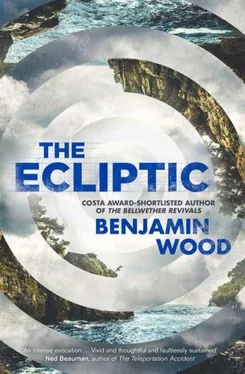I stopped.
There was nothing on the ground that I could see. But the clearing had a plundered look, the logs all stripped, forsaken. And I sensed that I would not return to these deepest woods again, that there was no more pigment after this. Because I would be gone before another cluster had grown fat enough to harvest.
When at last the old man came to snuff the candles in the portico, I closed my door and sealed its frame with the tape. The tacky lengths of it came off the roll so noisily, and I tried not to think of Fullerton or the sounds he must have heard when he had used it. I was responsible for that, I knew, and I would say as much to Victor on the phone. But there was nothing to be done about the boy till morning. The only time I knew for sure the provost left his study was just after sunrise, when he liked to take his Türk kahvesi on the front steps with Nazar. I would have to plant myself inside the mansion before then, but there was no sense in wasting the darkness.
My samples gleamed upon the wall: a chequerboard of blues. They were my guide in every way: not just because they gave me a small amount of light to paint by, but because they helped me judge my mixes and my tones. All that work I had done in the past few seasons — getting the pigment right, learning all its facets and refining my technique — came to fruition that night. For the first time I could remember, I knew exactly what I had to paint and how to achieve it. I could not tell if this was clarity or just the prelude to it, but I hoped it would never leave me.
I emptied all the mushrooms from my satchel, cutting through the liners. A spume of blue rushed from the punctured plastic, as though I had unearthed some underground lagoon. It did not take me long to garland them — eight strings of fungus in total, densely packed — and I hung them from the crossbar of my closet to dry out. I retrieved the one remaining garland from the depths where I had hidden it; its glow was that bit fainter than the rest, but it yielded plenty in the mortar when I ground it down. Loading all the powder on the slab, I went to consult my samples, checking the dosages of oil and fruithead sizes that were noted in the margins of the squares. Choosing the right tone and gleam, I made the measurements, added the linseed to the powder, slid the muller over it until I had a good consistency: thin enough to coat the bristles of a medium sable, thick enough to rest upon the blade-edge of a palette knife. And, loading up the largest, roundest brush I owned, I made the first commitment of the paint to canvas.
I had considered using a compass to put chalk lines on the nap that I could follow, thinking it would look cleaner if the circles were precise. But I changed my mind. Although I wanted it to be a purely abstract image, I had to do more than simply colour in blank spaces. Better to paint the overlapping circles freehand. If they were imperfect, fine. I needed them to look man-made. So I swept the brush around, using the natural roll of my shoulder — fast, flowing strokes that came from the whole arm, not just the wrist. And when the paint began to scuff out, I loaded up the brush again, and kept on going with the same circling motions, over and over, working from the outside in, using up the whole batch of paint until I had made a complete disc. It rested on the left side of the canvas, neatly within the limits of the frame — the lighter of the three I planned to paint. A hue so radiant it soothed me like a nightlight, so lucent I could see the trails of brush marks and the nap of the primed fabric underneath.
The mortar and the pestle, the muller and the slab, the brushes and the knife, the workbench — all of them had to be washed and dried again before I could start the next phase. I went about the task quite hurriedly, impatient to begin again, and wary of the failing darkness. When everything was clean, I lifted the bathroom cabinet from its brackets, got out the tobacco tin and brought it to the slab. More tape to unpick and peel away — I thought again of Fullerton — and as the lid hinged open, there was a powder-puff of blue that almost made me sneeze. I scooped it all onto the marble, checked my samples for the apt mix ratio, table-spooned the linseed on and worked it with the muller. This paint had to be a little thinner, with a deeper tone, a richer glare. When it was ready, I applied it to the canvas with the same sweeping gestures. This circle was supposed to be exactly the same size, and I needed to judge its scale by instinct. Its left-hand side was meant to overlap the other circle at the halfway mark. So, as the two discs overlaid, both tones merged, forming a segment with a hue all of its own.
I did not stop working until all the paint was spent and the mural showed two beaming discs of blue, one fractionally weaker than the other. I had no pigment left to make the final circle. Birds were chirruping outside and I was running out of darkness. The paint would need to dry but I could not leave it for the world to see, so I covered it with bedsheets, fixing brushes to the top edge of the frame to keep the linen off the surface. I scrubbed my hands with soap. And, checking that the old man’s keys were still in my pocket, I pulled my door until the tape tore off and it swung back. The sun was not quite up yet. There was a rinse of dew upon the lawns that smelled familiar. I slatted my eyes against the light and sprinted for the mansion, still in my painting clothes, with pigment on my boot caps and my hair part-streaked with oil.
The fatigue hit me when I reached the hallway. My muscles burned and pinched. But I kept going, quietly up the stairs, trying to mute my every footstep. The floorboards gave off cawing sounds until I reached the landing, where the mess hall door was fully agape and I could hear the clatterings of Gülcan in the kitchen. She worked ten times as hard as anyone: the last to bed, the first to rise. I could not say what made her do it, but she always did it smiling.
I went bounding up another flight — the highest stairs were carpeted and dampened my footfalls. There were empty lodgings in the east wing, but I did not know which doors would open onto them. I had to guess. I pressed my ear to the wood and heard the sounds of snoring. I chose another door: silence. Twisting the handle steadily, as though a single squeak from it would wake up all of Heybeliada, I pushed at it and stole inside. The mattress was bare and mapped with stains. Day was dawning in the window. I was alone.
It was impossible to stop my heart from jouncing; slow breaths in and out did very little. My bones were lagging. I kept the door ajar a tiny crack and peered along the hall. For a good while, nothing stirred. I wondered what would happen if the provost shunned his Turkish coffee. How long would I wait for him? Until the breakfast bell? Till lunch? I thought about my mural, feeling a pride so copious it warmed my cheeks. It occurred to me that even if the provost caught me I would soon be leaving. I could deliver my message to Victor in person. And this notion made me anxious. I started reasoning myself into a knot: Did I even need to make the call? Was it not safer just to finish off my work and leave with all my documents in order? How important was it, really, for Victor to be told?
Suddenly, there came a scrape of claws in the corridor. Nazar was hurtling for the stairs. I watched the provost edge out from his room, locking the door. Such languidness about his movements. He trailed his bamboo cane along the skirting boards and yawned. Reaching the landing, he leaned upon the balustrade. I thought he might have seen me. But then Nazar whimpered from the flight below and he spun round. ‘Ah, there you are,’ the provost said. ‘I thought we agreed you wouldn’t do that any more?’ And he went downstairs and out of sight, saying, ‘Get on with it, scamp, or you’re going to get trampled.’
Читать дальше












